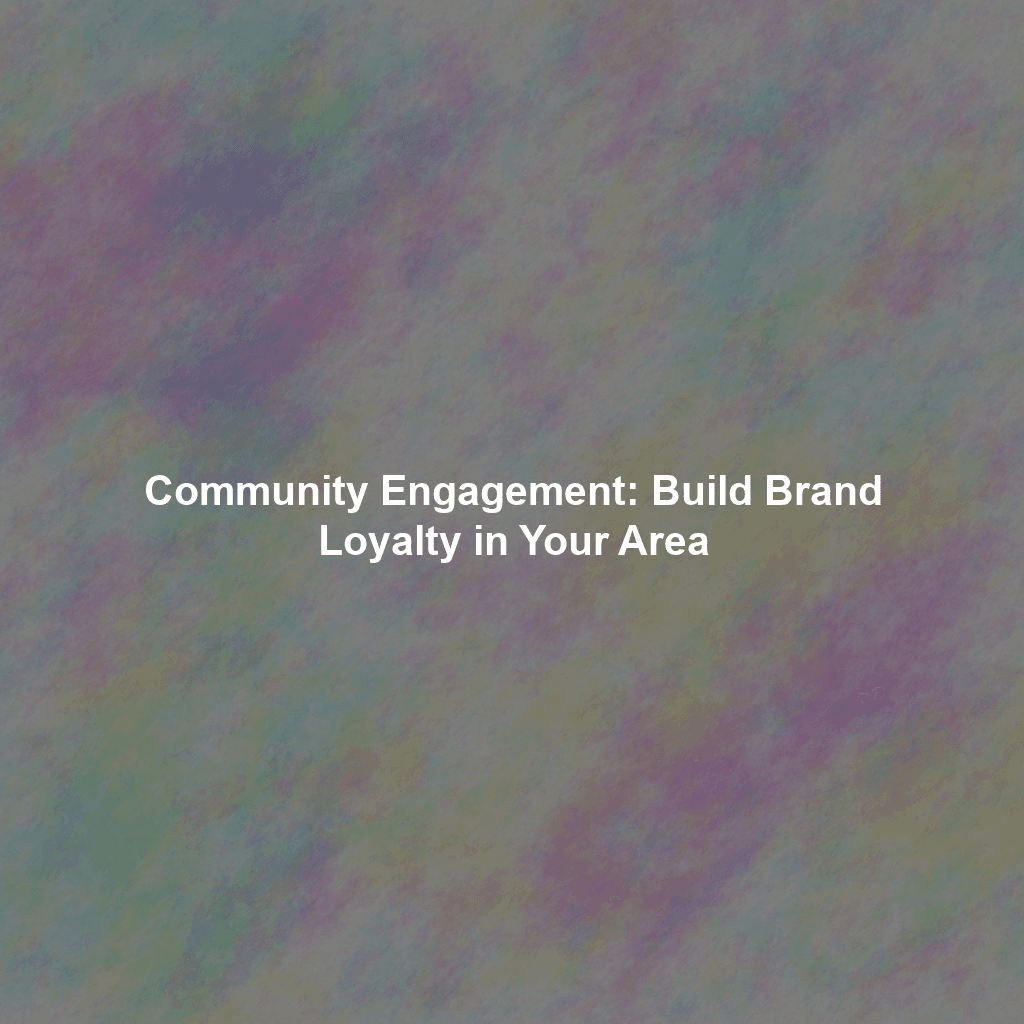What Exactly is Community Engagement? A Strategic Definition
Community engagement encompasses any deliberate, structured activity your business undertakes to connect with, contribute to, and collaborate with the local area it serves. It’s about becoming an active, valuable, and indispensable member of your neighborhood, not just a transient entity operating within it. It’s a reciprocal, two-way street. It’s not merely about broadcasting your message or writing a check; it’s about:
- Active Listening: Genuinely understanding the community’s needs, concerns, and aspirations.
- Meaningful Response: Responding to those needs in a tangible, impactful way that aligns with your business’s capabilities and values.
- Relationship Building: Cultivating authentic, long-term relationships with residents, local organizations, schools, and other businesses.
- Shared Value Creation: Contributing to the social, economic, and environmental well-being of the community, creating benefits for both your business and the residents.
This approach builds profound trust and demonstrates that your business cares about more than just profit; it cares about people and place. This commitment directly contributes to your brand’s **E-E-A-T (Experience, Expertise, Authoritativeness, Trustworthiness)** in the local market, making you a preferred choice.
Why Invest in Local Community Engagement? The Quantifiable ROI is Real
While the benefits of community engagement might initially seem intangible, the return on investment (ROI) can be remarkably significant and directly measurable. For a CFO or CEO, this isn’t just about “doing good”; it’s about smart business. Here are compelling, data-backed reasons why your business should strategically prioritize community involvement:
- Increased Brand Awareness & Visibility: Active participation in local events, sponsorships, and initiatives naturally raises the visibility of your brand within the community. People are far more likely to remember and support businesses they consistently see actively contributing to their neighborhood. This translates into increased foot traffic, website visits, and local search presence.
- Enhanced Brand Reputation & Trust: Positive, authentic community involvement directly translates into a superior brand reputation. Customers are inherently drawn to businesses that are perceived as ethical, responsible, and genuinely caring. A strong local reputation builds immense trust, which is a critical differentiator in a crowded market. A 2023 Edelman Trust Barometer report indicated that 61% of consumers are more likely to buy from brands that demonstrate social responsibility.
- Stronger Customer Loyalty & Retention: Customers who feel a genuine connection to your brand through its community engagement efforts are far more likely to become loyal, repeat customers. This emotional bond often transcends price considerations; they’ll choose your business over competitors, even if the price is slightly higher, because they feel a shared sense of purpose. This directly impacts customer lifetime value (CLTV).
- Improved Employee Morale & Productivity: Employees are demonstrably proud to work for companies that actively give back to the community. This sense of pride, purpose, and positive impact can significantly boost morale, increase engagement, and reduce employee turnover. A motivated workforce is a more productive workforce. Studies by Gallup consistently show that highly engaged teams are 21% more profitable.
- Attracting and Retaining Top Talent: In today’s competitive job market, candidates, especially younger generations, are actively seeking employers with strong social responsibility and community involvement. A robust, authentic community engagement program can be a powerful recruitment and retention tool, attracting mission-driven talent.
- Organic Word-of-Mouth Marketing: Satisfied customers who feel a deep connection to your brand are exponentially more likely to become vocal advocates, recommending your business to friends, family, and colleagues. This organic, trusted word-of-mouth marketing is incredibly valuable and cost-effective, often outperforming paid advertising.
- Positive Public Relations & Media Coverage: Genuine community involvement often generates positive, authentic media coverage from local news outlets, blogs, and social media influencers. This earned media further amplifies your brand’s message, enhances its reputation, and provides credible third-party validation.
- Competitive Advantage & Market Differentiation: In a crowded, often commoditized marketplace, community engagement can be a key differentiator. It allows you to stand out from competitors who are solely focused on price or product features, creating a unique value proposition that resonates with conscious consumers.
Anecdote: The Local Bakery’s Sweet Success
A small, independent bakery, “The Daily Loaf,” in a bustling neighborhood struggled against larger chain competitors. Instead of cutting prices, they launched a “Community Dough-nation” program, donating all unsold baked goods daily to local shelters and food banks. They actively promoted this on their social media and in-store. Within six months, their sales increased by 20%, and local residents consistently cited their community efforts as the primary reason for choosing them over competitors. “It wasn’t just about selling bread,” the owner stated, “it was about being a part of the community. That connection translated directly into loyalty and revenue.” This demonstrates the power of tangible, consistent community impact.
Practical Strategies for Community Engagement: Get Involved and Make a Difference (Your Action Plan)
Now that you understand the profound benefits, let’s explore some practical, actionable strategies for authentically engaging with your local community. Remember, consistency and genuine intent are paramount.
1. Sponsor Local Events and Organizations: Strategic Alignment
Sponsoring local sports teams, school events, charity fundraisers, community festivals, or arts programs is a powerful way to show your support and gain visibility. Critically, consider sponsoring an event or organization that genuinely aligns with your brand values and target audience. For example, a health food store could sponsor a local 5K run or a youth soccer league, while a bookstore might sponsor a local literary festival or school reading program. This strategic alignment enhances authenticity and maximizes impact.
2. Partner with Local Charities and Non-Profits: Tangible Impact
Partnering with local charities allows you to support important causes and make a tangible, measurable difference in your community. This can take various forms:
- Percentage of Sales: Offer to donate a percentage of your sales from specific products or during certain periods.
- Volunteer Time: Organize regular team volunteer days at local shelters, food banks, or environmental clean-ups.
- In-Kind Donations: Provide your products or services to help non-profits achieve their mission.
- Joint Campaigns: Collaborate on awareness or fundraising campaigns.
Transparency is key; clearly communicate your partnership and the specific impact you’re making to your customers. This builds trust and encourages participation.
3. Host Community Events at Your Business: Creating a Hub
Consider transforming your business space into a community hub by hosting events that are open to the public. This could be anything from educational workshops and seminars (e.g., “Financial Planning for Small Businesses” by a local accountant) to open houses, holiday celebrations, or local artist showcases. These events provide a direct, low-pressure opportunity to connect with potential customers, showcase your products or services in a natural setting, and build relationships. A coffee shop could host open mic nights, a yoga studio could offer free community classes, or a hardware store could host DIY workshops.
4. Participate in Local Festivals and Fairs: Direct Engagement
Setting up an engaging booth at local festivals, farmers’ markets, and fairs is a fantastic way to reach a large, diverse audience directly within your community. Offer samples, live demonstrations, interactive experiences, or special discounts to attract visitors. Make sure your booth is visually appealing, clearly branded, and staffed by enthusiastic employees who can articulate your community involvement.
5. Support Local Schools and Educational Initiatives: Investing in the Future
Supporting local schools demonstrates a profound commitment to the future of your community and can build immense goodwill. This can range from donating supplies, sponsoring extracurricular activities (sports, arts, robotics clubs), offering scholarships, or providing mentorship programs. Partnering with schools on career days, offering internships, or participating in fundraising drives are other excellent avenues for involvement. This builds long-term relationships with families and future talent.
6. Offer Discounts and Special Promotions to Local Residents: Reciprocal Value
Show your appreciation for your local customers by offering exclusive discounts and promotions. This could be as simple as offering a discount to residents who live within a certain radius of your business, providing a special offer during local events, or creating a “local loyalty card.” Make sure to promote these offers effectively through local channels (local newspapers, community boards, local social media groups) to ensure they reach the intended audience. This fosters a sense of belonging and reciprocal value.
7. Volunteer Your Time as a Team: Internal & External Impact
Organize regular team volunteer days at local charities, community gardens, or environmental projects. This not only directly benefits the community but also strengthens team bonds, boosts employee morale, and provides excellent internal PR. Choose a cause that genuinely resonates with your team members and make it a regular, scheduled event to demonstrate sustained commitment.
8. Engage Online Through Local Social Media Groups: Digital Community Building
Join relevant local social media groups (e.g., neighborhood Facebook groups, Nextdoor) and actively participate in conversations. Offer helpful advice, answer questions related to your expertise, and share relevant, non-promotional information about your business’s community efforts. Avoid overly promotional posts; the goal is to build genuine relationships and provide value to the community, not just sell your products or services. Be a resource, not just an advertiser.
9. Solicit and Act on Customer Feedback: Demonstrating Responsiveness
Actively solicit feedback from your local customers, both directly and indirectly (e.g., surveys, review platforms, suggestion boxes). Use this feedback to genuinely improve your products, services, and community engagement efforts. Showing that you value their opinions and are committed to meeting their needs demonstrates responsiveness, builds trust, and reinforces your brand’s commitment to the local community.
10. Partner with Other Local Businesses: Collaborative Growth
Collaborate with other local, non-competing businesses on joint marketing initiatives or community projects. This allows you to reach a wider, shared audience and leverage each other’s strengths. Cross-promotions, joint events (e.g., a “Local Business Crawl”), shared advertising, or co-sponsored community initiatives are all effective ways to build a stronger local business ecosystem and amplify your collective impact.
Measuring the Success of Your Community Engagement Efforts: The Data-Driven Approach
To truly understand the ROI and optimize your community engagement efforts, it’s crucial to track the results rigorously. This isn’t about vague feel-good metrics; it’s about quantifiable impact. Here are some key metrics to monitor:
- Website Traffic (Local Sources): Track website traffic originating from local IP addresses, local search queries (e.g., “your business near me”), and referrals from local directories or community websites. This indicates increased local awareness.
- Google Business Profile (GBP) Performance: Monitor views, clicks (to website, phone calls, directions), and reviews on your Google Business Profile. Community engagement often directly translates into more local searches and positive reviews.
- Social Media Engagement (Local): Monitor your social media engagement (likes, shares, comments) specifically on community-focused content. Track mentions in local social media groups and sentiment.
- Customer Feedback & Reviews: Track the volume and sentiment of customer feedback across all channels (online reviews, direct surveys, in-store comments). Look for mentions of your community involvement.
- Sales and Revenue (Local): Implement tracking mechanisms to monitor sales and revenue specifically from local customers. This might involve loyalty programs, zip code analysis, or attributing sales to specific local promotions.
- Brand Mentions & Media Coverage: Track brand mentions in local media (newspapers, local blogs, community newsletters) and online news outlets. Quantify the reach and sentiment of this earned media.
- Employee Satisfaction & Retention: Conduct internal surveys to gauge employee morale and pride related to community involvement. Track employee turnover rates.
- Partnership Impact: For sponsorships or collaborations, track the visibility generated, leads referred, or joint project outcomes.
Use this data to refine your strategy, identify which initiatives are delivering the best results, and allocate resources effectively. Remember that community engagement is an ongoing process, not a one-time event. Be patient, persistent, and genuinely committed, and you’ll see the profound, long-term benefits for both your business and the community.
Real-World Examples of Community Engagement Success: Inspiring Action
To illustrate the tangible power of authentic community engagement, let’s look at some real-world examples that transcend mere marketing:
- Patagonia: Environmental Activism as Core Business
Known globally for its outdoor apparel, Patagonia has built its brand around deep environmental activism. They actively support local environmental organizations, donate 1% of sales to grassroots environmental groups, and encourage customers to get involved in conservation efforts. This unwavering commitment to sustainability resonates deeply with its target audience, fostering unparalleled brand loyalty and advocacy. Their community engagement isn’t a separate initiative; it’s fundamental to their business model, directly impacting their “Trustworthiness” and “Authoritativeness.” - REI: Fostering Outdoor Community
REI (Recreational Equipment, Inc.) is dedicated to getting people outdoors and actively supports local outdoor recreation initiatives. They offer workshops, guided tours, and community events focused on outdoor skills and environmental stewardship. They also invest in trail maintenance and conservation efforts. This creates a powerful community around shared values, driving sales and membership. - Local Coffee Shops: Creating Neighborhood Hubs
Many successful local coffee shops transcend being mere places to buy coffee. They become true neighborhood hubs by actively engaging. This often includes displaying and selling local artists’ work, hosting open mic nights, sponsoring local school fundraisers, or offering free meeting spaces for community groups. This creates a welcoming atmosphere and fosters a deep sense of community belonging, making them indispensable local institutions. - Small Bakeries: Sweet Acts of Kindness
Beyond the “Daily Loaf” anecdote, countless small bakeries consistently donate their leftover baked goods to local shelters, food banks, or community centers at the end of each day. This simple, consistent act of kindness directly helps those in need, reduces food waste, and builds immense goodwill and positive word-of-mouth in the community, often becoming a defining characteristic of their brand.
These examples demonstrate that community engagement can take many forms, from large-scale, brand-defining initiatives to consistent, everyday acts of kindness. The key is to find ways to authentically connect with your local community, address genuine needs, and make a positive, consistent impact.
Avoiding Common Pitfalls: Authentic Engagement is Key (Don’t Fake It)
While community engagement offers significant benefits, it’s crucial to avoid common pitfalls that can undermine your efforts and damage your brand reputation. Authenticity is paramount; customers and communities can easily spot insincerity.
- Lack of Genuine Intent: Don’t engage in community activities solely for the sake of marketing or PR. Genuine care and a desire to contribute are essential. Customers can easily spot insincerity, which will severely damage your reputation and erode trust.
- “Greenwashing” or “Causewashing”: Avoid exaggerating your environmental or social impact. Be transparent about your efforts, provide verifiable data, and avoid making unsubstantiated claims. Hypocrisy is quickly exposed and severely penalized by today’s consumers.
- Short-Term, Sporadic Commitment: Community engagement is not a short-term fix or a one-off event. It requires a sustained, consistent commitment over time to build deep trust and credibility. Inconsistent efforts can be perceived as opportunistic.
- Ignoring Community Needs: Don’t assume you know what the community needs. Listen actively to their concerns, conduct local surveys, and engage with community leaders to tailor your efforts accordingly. Imposing solutions without understanding needs is ineffective.
- Over-Promotion of Your Business: Focus primarily on providing value to the community, not just overtly promoting your business. While visibility is a benefit, overly promotional content within community initiatives can be off-putting and seen as self-serving. Let the positive impact speak for itself.
- Lack of Transparency: Be transparent about your motivations, your contributions, and the impact of your efforts. Share stories, progress, and challenges openly.
- Excluding Stakeholders: Ensure your community engagement efforts are inclusive and consider diverse voices and needs within the community.
Conclusion: Building a Brighter Future, Together – The Ultimate ROI
Community engagement is more than just a marketing strategy; it’s a profound way to build a stronger, more vibrant community while simultaneously building a more successful, resilient, and respected business. By strategically investing in local initiatives, authentically supporting local organizations, and genuinely connecting with local residents, you can foster unparalleled brand loyalty, enhance your reputation, attract top talent, and create a lasting positive impact on the world around you. This commitment to shared value creation is the ultimate ROI.
So, take the first step today. Identify authentic opportunities to get involved in your local community and start building meaningful, reciprocal relationships. The rewards, both for your business and for the community it serves, are well worth the effort. This is not just good business; it’s responsible, sustainable business that builds a brighter future, together.
 Skip to content
Skip to content

